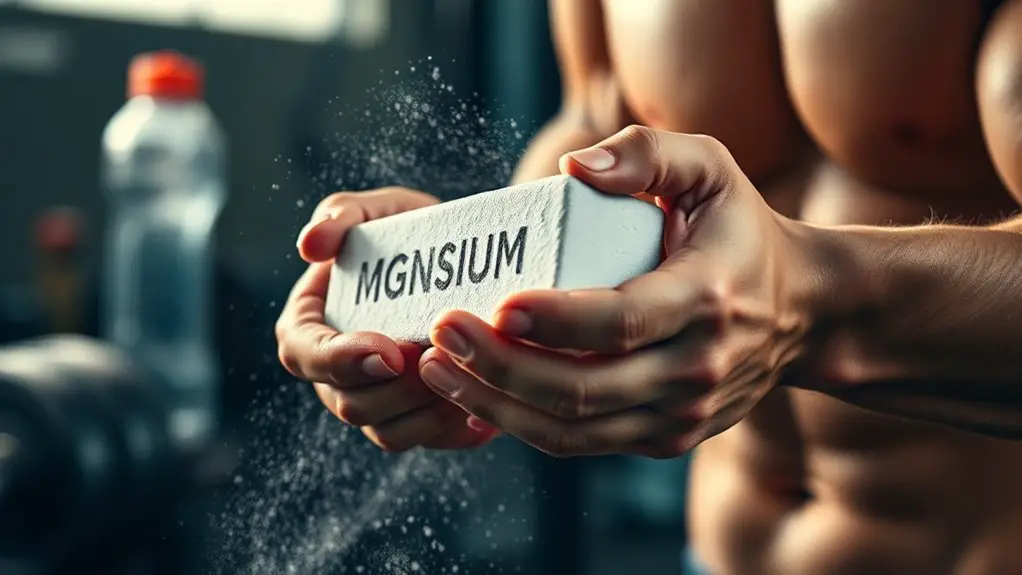The Role of Magnesium in Gym Performance and Recovery

Magnesium plays an essential role in enhancing your gym performance and recovery. It helps regulate muscle contractions, reducing soreness and cramps while improving relaxation after intense workouts. Additionally, magnesium supports energy production by maintaining ATP levels, ensuring your muscles have the energy they need. If you’re experiencing muscle fatigue or mood changes, it could be signs of low magnesium. Discovering the best sources and supplementation strategies can further optimize your fitness journey.
Understanding Magnesium: An Essential Mineral for Athletes

Magnesium plays an essential role in athletic performance, acting as a key player in various bodily functions that support exercise. It’s important for energy production, muscle contraction, and nerve function, which are crucial during workouts. To reap these benefits, your body needs to effectively absorb magnesium from dietary sources like nuts, seeds, and leafy greens. However, while magnesium is beneficial, it’s important to be cautious about supplementation. Excessive intake can lead to magnesium toxicity, resulting in symptoms such as nausea, diarrhea, and even irregular heartbeats. To avoid this, it’s best to focus on obtaining magnesium through a balanced diet, ensuring ideal absorption without risking overconsumption. Understanding the balance of magnesium in your diet can enhance your performance and recovery, making it a significant mineral for athletes. Always consult with a healthcare provider before making significant changes to your magnesium intake.
The Impact of Magnesium on Muscle Function
When it comes to muscle function, adequate levels of magnesium are vital for ideal performance. Magnesium plays a pivotal role in muscle contractions, acting as a natural calcium blocker. This balance guarantees that your muscles contract and relax properly during exercise. Without sufficient magnesium, you might experience muscle cramps or spasms, hindering your workout.
To optimize your magnesium absorption, consider dietary sources or supplements, but be mindful of the recommended daily intake. Here’s a quick overview of how magnesium impacts muscle function:
| Aspect | Impact of Magnesium |
|---|---|
| Muscle Contractions | Regulates contraction and relaxation |
| Recovery | Reduces muscle soreness |
| Absorption | Enhances overall nutrient utilization |
Magnesium’s Role in Energy Production

In addition to its vital role in muscle function, magnesium is also a key player in energy production. This mineral is essential for energy metabolism, as it acts as a cofactor in numerous enzymatic reactions that convert food into usable energy. Without adequate magnesium absorption, your body may struggle to efficiently metabolize carbohydrates, fats, and proteins, ultimately affecting your energy levels during workouts.
Moreover, magnesium helps maintain ATP (adenosine triphosphate) levels, the primary energy carrier in your cells. Low magnesium levels can lead to decreased ATP availability, which means less energy for your muscles when you need it most. By ensuring you consume enough magnesium through diet or supplements, you can support ideal energy production, enhancing your gym performance. So, if you want to maximize your workouts and maintain stamina, paying attention to your magnesium intake is vital for effective energy metabolism.
Enhancing Recovery: How Magnesium Supports Post-Workout Healing
After an intense workout, magnesium plays an essential role in your recovery by promoting muscle relaxation and reducing inflammation. This mineral helps your muscles release tension, which can alleviate soreness and improve flexibility. Additionally, its anti-inflammatory properties support faster healing, allowing you to get back to your training routine more efficiently.
Muscle Relaxation Benefits
Although intense workouts can leave your muscles feeling tight and fatigued, magnesium plays an essential role in promoting muscle relaxation and recovery. This mineral helps regulate muscle function, reducing muscle tension and cramping. By supporting the body’s natural relaxation techniques, magnesium aids in calming overactive nerves and muscles post-exercise. Research indicates that adequate magnesium levels can enhance the effectiveness of recovery protocols, minimizing soreness and improving overall muscle function. Incorporating magnesium into your diet can also facilitate better sleep quality, allowing your body to heal more efficiently. Whether through supplements or magnesium-rich foods, ensuring you get enough of this crucial mineral can greatly enhance your post-workout recovery experience and overall gym performance.
Reducing Inflammation Effects
When it comes to post-workout recovery, magnesium’s role in reducing inflammation cannot be overstated. Research shows that magnesium helps modulate inflammatory responses, promoting inflammation reduction in your muscles after intense exercise. This mineral aids in balancing the body’s stress hormones, which can spike during workouts, leading to inflammation. By supporting the synthesis of anti-inflammatory compounds, magnesium enhances recovery enhancement, allowing you to bounce back more effectively. Adequate magnesium levels can also improve sleep quality, further contributing to faster recovery. So, whether you’re lifting weights or running, consider adding magnesium-rich foods or supplements to your routine. Doing so could markedly reduce post-exercise inflammation and improve your overall recovery experience.
Signs of Magnesium Deficiency in Active Individuals

If you’re experiencing muscle cramps and spasms, persistent fatigue, or mood and sleep issues, it might be a sign of magnesium deficiency. Active individuals often overlook these symptoms, but they can greatly impact your performance and recovery. Recognizing these signs early can help you address any deficiencies and enhance your overall gym experience.
Muscle Cramps and Spasms
Muscle cramps and spasms can often signal a magnesium deficiency, especially in active individuals who exert themselves regularly. This mineral plays a vital role in muscle recovery and maintaining electrolyte balance. When magnesium levels drop, your muscles may become more prone to cramping, disrupting your workouts and recovery periods.
| Signs of Magnesium Deficiency | Impact on Exercise |
|---|---|
| Muscle Cramps | Reduced performance |
| Spasms | Increased recovery time |
| Fatigue | Decreased motivation |
To prevent these issues, make sure you’re getting enough magnesium through your diet or supplementation. Foods like leafy greens, nuts, and whole grains can help restore your magnesium levels, ultimately supporting your muscle recovery and overall performance.
Fatigue and Weakness
Although you might push through workouts with determination, fatigue and weakness can derail your performance, often indicating a magnesium deficiency. Low magnesium levels can lead to exercise fatigue, making it difficult to maintain your energy levels during intense training. This essential mineral plays an important role in muscle function, and inadequate amounts can result in muscle weakness, impacting your strength and endurance. Research shows that magnesium helps regulate muscle contractions and energy production, so a deficiency can greatly hinder your workout capabilities. If you notice persistent fatigue and muscle weakness, it’s essential to assess your magnesium intake. Incorporating magnesium-rich foods or supplements can help restore your levels, improve performance, and support recovery, allowing you to train effectively.
Mood and Sleep Issues
When you’re hitting the gym hard, it’s easy to overlook how your mood and sleep might be affected by low magnesium levels. Magnesium plays an important role in regulating neurotransmitters that affect mood enhancement. A deficiency can lead to symptoms like anxiety, irritability, and even depression, impacting your overall performance and motivation. Additionally, low magnesium levels can disrupt your sleep quality, making it harder to recover effectively after workouts. Research suggests that adequate magnesium intake promotes deeper, more restorative sleep, which is essential for muscle recovery and performance. If you notice changes in your mood or sleep patterns, consider evaluating your magnesium intake. Ensuring you have enough magnesium can help you maintain both mental well-being and physical performance.
Best Dietary Sources of Magnesium for Fitness Enthusiasts

As you endeavor to enhance your gym performance, incorporating magnesium-rich foods into your diet can be a game changer. Magnesium supports muscle function and recovery, so focusing on the right sources is essential. Here are some of the best dietary options you should consider:
- Leafy greens: Spinach and kale are excellent sources that can be easily added to salads or smoothies.
- Nut varieties: Almonds and cashews provide a tasty snack while boosting your magnesium intake.
- Whole grains: Quinoa and brown rice are not only nutritious but also help fuel your workouts.
Additionally, don’t overlook seed snacks like pumpkin seeds or indulge in dark chocolate for a delicious magnesium boost. Incorporating these foods into your meals can help you maintain ideal magnesium levels, supporting both performance and recovery in the gym.
Supplementing With Magnesium: What You Need to Know
Have you considered the potential benefits of supplementing with magnesium for your gym performance? Magnesium plays an essential role in muscle function, energy production, and recovery. When you supplement, it’s important to guarantee proper magnesium absorption; this can be influenced by factors like the form of magnesium you choose and your diet. Common forms include magnesium citrate or glycinate, which are known for better absorption rates.
As for the ideal dosage, studies suggest that adults may benefit from 310 to 420 mg per day, depending on age and activity level. Too much magnesium can lead to side effects like diarrhea and cramping, so it’s best to start with a lower dose and adjust as needed. Always consult a healthcare professional before beginning any supplement regimen. By effectively incorporating magnesium into your routine, you can enhance your performance and support recovery in your fitness journey.
Frequently Asked Questions
Can Magnesium Improve Athletic Performance in Non-Endurance Sports?
Did you know that nearly 50% of athletes don’t get enough magnesium? This mineral’s essential for muscle function and can play a significant role in strength training. It helps with energy production and muscle contraction, which can enhance your performance even in non-endurance sports. By ensuring adequate magnesium intake, you might find improvements in strength, recovery, and overall athletic performance, allowing you to push your limits more effectively during workouts.
Is Magnesium Safe for Everyone to Supplement?
Magnesium supplementation can be beneficial, but it isn’t safe for everyone. While many can tolerate it well, you should consider individual health conditions. It’s essential to follow supplement guidelines and consult a healthcare professional, especially if you have kidney issues or are on certain medications. Natural magnesium sources, like leafy greens and nuts, are generally safer. Always prioritize getting nutrients from food before turning to supplements to guarantee ideal health and safety.
How Does Stress Impact Magnesium Levels in Athletes?
Did you know that nearly 80% of athletes experience magnesium depletion during intense stress? Stress triggers a stress response in your body, which can lead to significant reductions in magnesium levels. When you’re under pressure, your body uses more magnesium for energy production and muscle function. This depletion can impair your performance and recovery. To maintain ideal magnesium levels, it’s essential to manage stress effectively through relaxation techniques and proper nutrition.
What Are the Symptoms of Magnesium Overdose?
If you’re concerned about magnesium toxicity, it’s essential to know the overdose symptoms. These can include nausea, diarrhea, abdominal cramping, and fatigue. In severe cases, you might experience confusion, muscle weakness, or even irregular heartbeat. It’s important to be cautious with supplementation, especially if you have existing health conditions. Always consult a healthcare professional if you suspect an overdose or experience any alarming symptoms related to magnesium intake.
Can Magnesium Help With Sleep Quality for Athletes?
Think of sleep as a secret weapon for your recovery. Magnesium can indeed enhance sleep quality for athletes. It promotes relaxation and helps regulate sleep cycles. You can find magnesium sources in foods like spinach, nuts, and whole grains. To maximize its benefits, pair magnesium intake with good sleep hygiene practices—like maintaining a consistent bedtime and creating a calming bedtime routine. This combination might just lead you to the restful sleep you crave.





